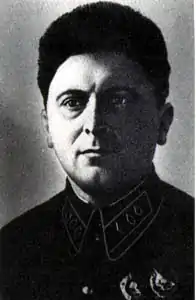Aleksandr Uspensky
Aleksandr Ivanovich Uspensky (Russian: Александр Иванович Успенский; 1902 – January 28, 1940) was a senior officer of the Cheka, the GPU and the NKVD. Uspensky was both a perpetrator and a victim of the Great Purge.
Aleksandr Ivanovich Uspensky Александр Иванович Успенский | |
|---|---|
 | |
| Personal details | |
| Born | 1902 |
| Died | January 28, 1940 Moscow, Soviet Union |
| Nationality | Soviet |
| Political party | CPSU (1920-) |
| Military service | |
| Allegiance | Soviet Union |
| Branch/service | NKVD |
| Years of service | 1920-1938 |
Biography
Uspensky was born on February 14 or February 28, 1902, in a family of forestry officials and made his career during the Russian Civil War. In August 1920, he joined the Cheka and in September the same year, he also became a member of the Russian Communist Party (b). On January 25, 1938, Uspensky became the Commissar of Internal Affairs of Ukraine.[1] During this time, Uspensky led the arrest of about 36,000 people.[2]
Demise
In the fall of 1938, he was summoned to Moscow. Since he assumed he would be arrested there (possibly warned by Nikolai Yezhov), Uspensky deserted on November 14, 1938, faked his own suicide and took refuge in the Ural Mountains. However, he was tracked down and arrested on April 15, 1939. On January 27, 1940, he was sentenced to death and executed the next day. Unlike many other senior officials and officers, Uspensky was not subsequently rehabilitated.[3]
References
- Chisnikov Vladimir. Heads of the State Security Bodies of Soviet Ukraine (1918-1953). Kiev.
- Uspensky A. I. // Petrov N. V., Skorkin K. V. Who led the NKVD, 1934-1941: reference book / Ed. N.G. Okhotin and A. B. Roginsky. - M .: Zvenya. 1999.
- "Uspensky, Alexander Ivanovich. On the site Chronos".